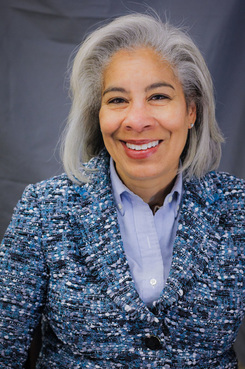Some Big Law Firms Applaud as Clients Get Tougher on Diversity
More clients are going beyond data on demographics to gauge their law firms' diversity efforts.
April 27, 2018 at 02:28 PM
4 minute read
 Leslie Richards-Yellen of Hogan Lovells.
Leslie Richards-Yellen of Hogan Lovells.
When it comes to promoting diversity among their outside lawyers, more and more clients are demanding that firms show, not just tell.
At 2,685-lawyer Hogan Lovells, the pace of client requests for demographic details about the firm's diversity has picked up and intensified since last year.
According to Leslie Richards-Yellen, who is director of inclusion for Hogan Lovells in the Americas, 47 clients requested diversity demographics from the firm in the first quarter of 2018—nearly double the 25 requests over the same period last year.
“We now have one person dedicated to filling out RFPs and client surveys about this,” Richards-Yellen said. She rates the increasing number of requests as good news. “We are delighted with the focus on diversity,” she said.
The growing attention on the issue has helped hone Richards-Yellen's notions of what client questions trigger the most meaningful responses. She and other lawyers focused on diversity say surveys that capture a snapshot of a firm's demographics—like what percentage of the workforce are women, underrepresented minorities and LGBTQ—provide just a starting point.
To really understand a firm's commitment, she said, clients need to go further, with questions like: “What kinds of work are people doing?”
Richards-Yellen said more clients are beginning to request the prospective roles and likely hours logged by specific members of a legal team proposed in a RFP, so they can gauge if a minority or female lawyer is being pitched as leader, a true participant—or just a token.
Sharon Nelles, a New York partner at 812-lawyer Sullivan & Cromwell, agrees clients need to delve deeper when they want to learn about diversity progress at their outside firms. Nelles helped roll out a program established by JPMorgan Chase & Co. earlier this year that requires 50 percent of the bank's outside litigation teams to be led by women or underrepresented minorities.
“A law firm's commitment to, and success with, diversity efforts cannot be revealed by a numbers snapshot,” Nelles said in an email.
“Statistics may make for easy comparisons across points in time, or across firms, but cannot measure culture,” Nelles said. “Clients can support diversity efforts by asking firms to dive deeper, thus establishing that this is not a numbers game.”
For example, Nelles said, clients can ask for the makeup of the teams currently working for them; what's being done to make specific client teams and the firms as a whole more diverse; and how those programs impact client service.
“Then follow-up. I am happy to tell you our numbers. I would rather tell you about our diverse lawyers. I would prefer even more to have those lawyers meet with you and partner with you to develop lasting relationships, which is what ultimately will push up the numbers,” Nelles added.
Due Diligence
One Hogan Lovells' client, Florida-based NextEra Energy Resources, definitely dug deeper after the firm submitted an RFP to the company. In its bid, Hogan Lovells had identified David Mitchell, a fifth-year associate who is African-American, as a lawyer who would work on the team if the firm won the work.
According to Richards-Yellen and Mitchell, Bobbie King, a senior attorney at NextEra, then stepped in to do some due diligence on the firm's diversity claims. King called Mitchell and asked if he knew about the RFP bid—and if he anticipated he really would be doing the work if NextEra awarded it to Hogan Lovells.
Mitchell and King, a former Skadden, Arps, Slate, Meagher & Flom associate, had known each other; they both are members of The Society of 1844, a group of about 60 African-American male lawyers, mostly working at big New York firms and Fortune 500 companies. The group is named after the year that Macon Bolling Allen, the first black lawyer in the United States, was admitted to practice law in Maine, and members meet monthly, according to Mitchell. (King declined to comment for this story because of his company's policies limiting contact with the press.)
King wanted to know if including Mitchell on the RFP was about “just putting someone's name or face on a pitch,” Mitchell said. King peppered him with questions, Mitchell recalled: Who would be supervising Mitchell on this deal? How was Mitchell's overall experience with that partner's prior supervision? He could answer those questions positively, Mitchell said.
“Folks at these companies, when they are asking for diverse teams, they are going to start to investigate,” Mitchell said, adding that he made sure to tell his supervising partners and Richards-Yellen about his exchange with King.
Richards-Yellen said she was elated to know a client had dug that deep. And, no surprise, Hogan Lovells won the work.
This content has been archived. It is available through our partners, LexisNexis® and Bloomberg Law.
To view this content, please continue to their sites.
Not a Lexis Subscriber?
Subscribe Now
Not a Bloomberg Law Subscriber?
Subscribe Now
NOT FOR REPRINT
© 2025 ALM Global, LLC, All Rights Reserved. Request academic re-use from www.copyright.com. All other uses, submit a request to [email protected]. For more information visit Asset & Logo Licensing.
You Might Like
View All
Strategic Pricing: Setting the Billable Hour at the Intersection of Psychology, Feedback and Growth


'Utterly Bewildering': GCs Struggle to Grasp Scattershot Nature of Law Firm Rate Hikes
Trending Stories
Who Got The Work
J. Brugh Lower of Gibbons has entered an appearance for industrial equipment supplier Devco Corporation in a pending trademark infringement lawsuit. The suit, accusing the defendant of selling knock-off Graco products, was filed Dec. 18 in New Jersey District Court by Rivkin Radler on behalf of Graco Inc. and Graco Minnesota. The case, assigned to U.S. District Judge Zahid N. Quraishi, is 3:24-cv-11294, Graco Inc. et al v. Devco Corporation.
Who Got The Work
Rebecca Maller-Stein and Kent A. Yalowitz of Arnold & Porter Kaye Scholer have entered their appearances for Hanaco Venture Capital and its executives, Lior Prosor and David Frankel, in a pending securities lawsuit. The action, filed on Dec. 24 in New York Southern District Court by Zell, Aron & Co. on behalf of Goldeneye Advisors, accuses the defendants of negligently and fraudulently managing the plaintiff's $1 million investment. The case, assigned to U.S. District Judge Vernon S. Broderick, is 1:24-cv-09918, Goldeneye Advisors, LLC v. Hanaco Venture Capital, Ltd. et al.
Who Got The Work
Attorneys from A&O Shearman has stepped in as defense counsel for Toronto-Dominion Bank and other defendants in a pending securities class action. The suit, filed Dec. 11 in New York Southern District Court by Bleichmar Fonti & Auld, accuses the defendants of concealing the bank's 'pervasive' deficiencies in regards to its compliance with the Bank Secrecy Act and the quality of its anti-money laundering controls. The case, assigned to U.S. District Judge Arun Subramanian, is 1:24-cv-09445, Gonzalez v. The Toronto-Dominion Bank et al.
Who Got The Work
Crown Castle International, a Pennsylvania company providing shared communications infrastructure, has turned to Luke D. Wolf of Gordon Rees Scully Mansukhani to fend off a pending breach-of-contract lawsuit. The court action, filed Nov. 25 in Michigan Eastern District Court by Hooper Hathaway PC on behalf of The Town Residences LLC, accuses Crown Castle of failing to transfer approximately $30,000 in utility payments from T-Mobile in breach of a roof-top lease and assignment agreement. The case, assigned to U.S. District Judge Susan K. Declercq, is 2:24-cv-13131, The Town Residences LLC v. T-Mobile US, Inc. et al.
Who Got The Work
Wilfred P. Coronato and Daniel M. Schwartz of McCarter & English have stepped in as defense counsel to Electrolux Home Products Inc. in a pending product liability lawsuit. The court action, filed Nov. 26 in New York Eastern District Court by Poulos Lopiccolo PC and Nagel Rice LLP on behalf of David Stern, alleges that the defendant's refrigerators’ drawers and shelving repeatedly break and fall apart within months after purchase. The case, assigned to U.S. District Judge Joan M. Azrack, is 2:24-cv-08204, Stern v. Electrolux Home Products, Inc.
Featured Firms
Law Offices of Gary Martin Hays & Associates, P.C.
(470) 294-1674
Law Offices of Mark E. Salomone
(857) 444-6468
Smith & Hassler
(713) 739-1250










